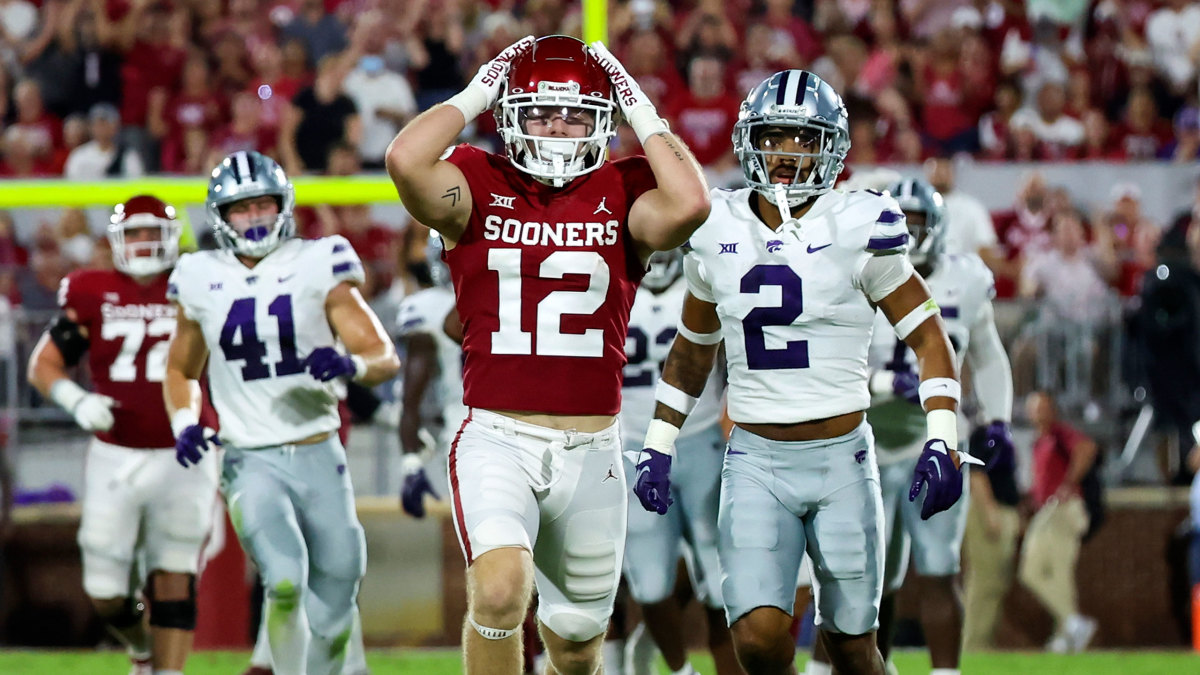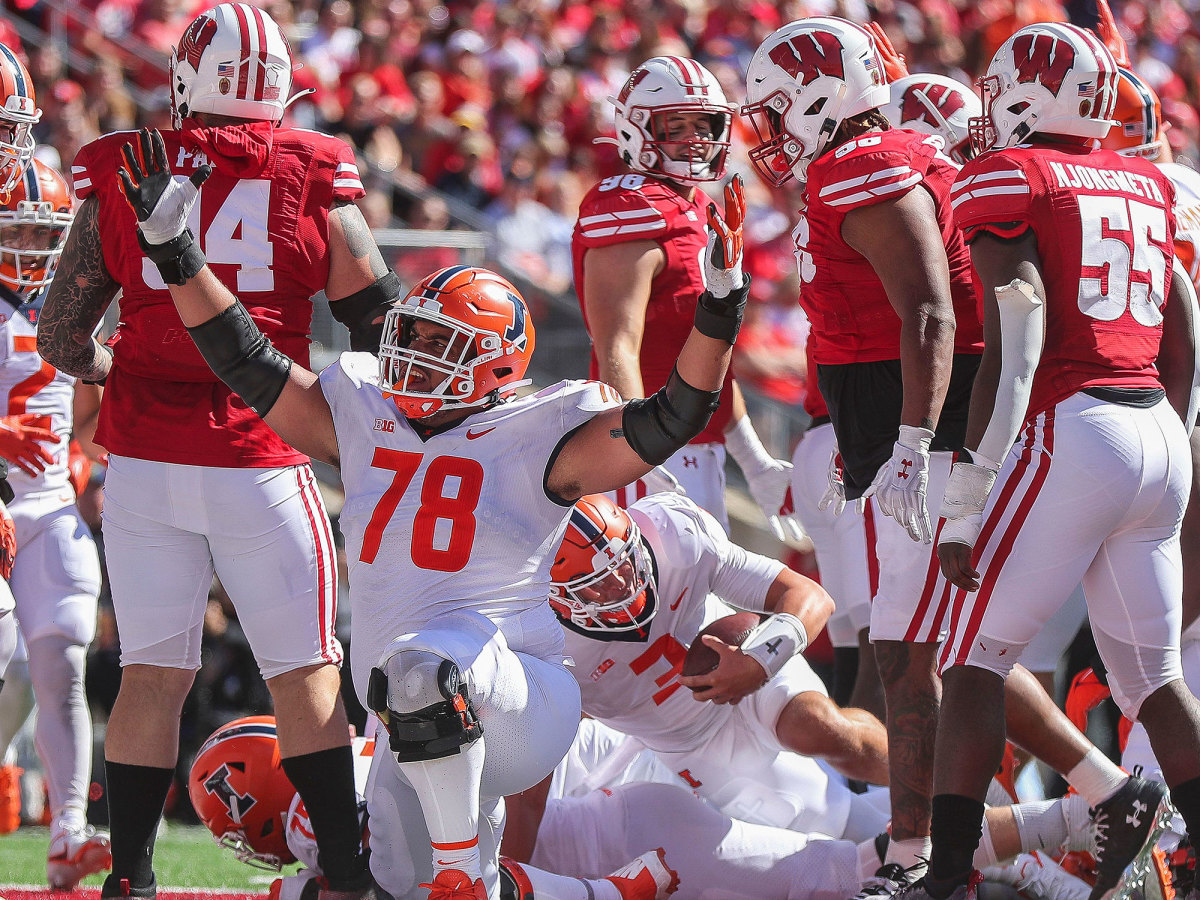Forde-Yard Dash: College Football’s New World Order Starts With the Big 12
Forty names, games, teams and minutiae making news in college football, where Dish Network and Disney/ESPN need to get their stuff together:
MORE DASH: Hot Seats | Coach Fights | Trap Games
SECOND QUARTER
HOW’S YOUR REALIGNMENT GOING?
For the vast majority of its 26-year existence, the Big 12 Conference’s centerpiece game has been the Red River Shootout between Oklahoma (11) and Texas (12). At least one of the two teams has been ranked in each of the last 24 meetings, and both were ranked in 16 of those. The Friday party in downtown Dallas, the Saturday-morning scene at the Texas State Fair, the neutral-field clash of crimson and burnt orange, the high stakes—it’s been a high holy day on the sport’s calendar, and it’s something the Southeastern Conference wanted as part of its inventory when it acquired the Sooners and Longhorns.
This year? It’s just another undercard game between struggling, unranked teams. The Big 12 instead can celebrate its Game of the Year (so far) Saturday in Lawrence, Kans., of all places. When undefeated Kansas (13) meets undefeated TCU (14), with ESPN’s College GameDay show handling the pregame hype, the plundered league can wave “Bye, Felicia” to the turncoats in Dallas. Again.

The Big 12 demonstrated its non-Texas/Oklahoma viability last year when Baylor and Oklahoma State met in a taut, dramatic league championship game. Now the unexpected rise of the No. 19 Jayhawks and No. 17 Horned Frogs provides added emphasis—and don’t forget about the No. 7 Cowboys and No. 20 Kansas State. The league is deep, and it will be getting deeper next year with the arrival of No. 16 BYU, No. 24 Cincinnati, UCF and Houston.
The Big 12 will miss Texas and Oklahoma badly in one place—the boardroom, where commissioner Brett Yormark will negotiate the conference’s next media-rights deal. On the field? Not so much these days. The rest of the league is surviving just fine, a point that will be made with great emphasis Saturday as the focus shifts away from Dallas and finds an improbable showdown on the plains.
There will be life for the Big 12 after losing the Red River game to the SEC. Seemingly a pretty good life.
There is no such vindication currently available for the other plundered Power 5 league, the Pac-12. Quite the opposite. The conference’s first football season since the jarring announcement that USC (15) and UCLA (16) are leaving is, at the moment, all about USC and UCLA.
The No. 6 Trojans and No. 18 Bruins, ticketed for the Big Ten in 2024, are the last two undefeated teams in the Pac-12. USC is 3–0 in the league with two of the wins on the road, a great start toward a possible berth in the conference championship game. UCLA made its first statement so far by pummeling previously unbeaten Washington in Pasadena on Friday night.
It might come to pass that neither Los Angeles team is the best in the Pac-12—keep respectful eyes on Utah and Oregon, both of which are playing well since season-opening losses to SEC opponents in hostile territory—but for now USC and UCLA are the story out West. The Trojans are the shiny new toy with Lincoln Riley coaching and Caleb Williams quarterbacking, leading the league in scoring. The Bruins are the methodical Chip Kelly rebuild, breaking through in his fourth season last year and perhaps achieving next-level relevance this year.
Games against Utah, the defending Pac-12 champion, loom large. And soon. The Utes come to the Rose Bowl on Saturday, and then USC visits Salt Lake City Oct. 15. After that we will have a better idea whether the L.A. story has staying power.
For the moment, the Pac-12 revolves around the two schools that are leaving. The Big 12 is moving on to Lawrence.
OTHER SIGNS OF THE NEW WORLD ORDER
The TCU-Kansas matchup isn’t the only indication that the landscape is changing in some locales. There are some other surprise contenders to consider:
After being bad forever, Illinois (17) very much looks like the best team in the abysmal Big Ten West. It has taken Bret Bielema just 17 games on the job to remind everyone in the conference that he can coach—most notably Wisconsin, where the former Badgers boss went in and ended Paul Chryst’s tenure Saturday. The Illini (4–1) are playing Bielema Ball—run the ball, stop the run. Chase Brown is second nationally in rushing at 146.6 yards per game, and the Illinois run defense is third nationally in yards allowed per game (70.2) and per carry (2.45). But the formula has been tweaked a bit; Illinois’s rushing total has decreased every game this season yet has been able to compensate with its most efficient passing game in many years.
Illinois hasn’t had a winning season since 2011, has never won a division championship and last won the Big Ten title in ’01. Winning the West would be a massive accomplishment for the program. Even if that is followed by being slaughtered in the league championship game.

Duke (18) has lost only to undefeated Kansas (a sentence that tells you this has been a surreal season). The Blue Devils haven’t beaten much of anyone yet—Temple, Northwestern, North Carolina A&T and Virginia—but there have been years when even the putative winnable games were losable. That includes the past two seasons, when Duke went a combined 5–18, necessitating the coaching change that brought in Mike Elko. With a veteran offensive line, several good running backs and a mobile quarterback, the Devils are leading the ACC in rushing yards per carry (5.33). They also lead the league in turnover margin (plus-eight).
The Blue Devils’ last winning season was in 2018, and their only appearance in the ACC title game was in ’13. The North Carolina–Duke game Oct. 15 won’t exactly be the stuff of Final Four legend, but the winner could take sole possession of first in the mangy Coastal Division.
On the Atlantic side of the league, Syracuse (19) is 5–0 for the first time in 35 years. That team went 11-0-1; this team will lose several times. But for a program that has had just one winning season in the last seven, these are heady times. The Orange have never finished the year leading the ACC in total defense, but they are there right now. Coordinator Tony White, a former Rocky Long protégé, has done nice work since coming to Syracuse in 2020.
The Orange get an open date this week to rest up for a rigorous rest of the month: North Carolina State, at Clemson, Notre Dame. Dino Babers, who has just one winning season in his first six, could well be in the process of saving his job again.
James Madison (20) has been in the news a lot lately, and not just because of the flute Lizzo played. The school’s football team is 4–0 in its first season at the FBS level, including a dramatic comeback upset of Appalachian State. The Dukes were a high-quality FCS program for a long time, and thus far the transition up has been smooth sailing. JMU leads the nation in total defense and could make a run at the Sun Belt title—except it’s not eligible as a first-year FBS program.
Watch college football with fuboTV. Start your free trial today.
MORE DASH: Hot Seats | Coach Fights | Trap Games
